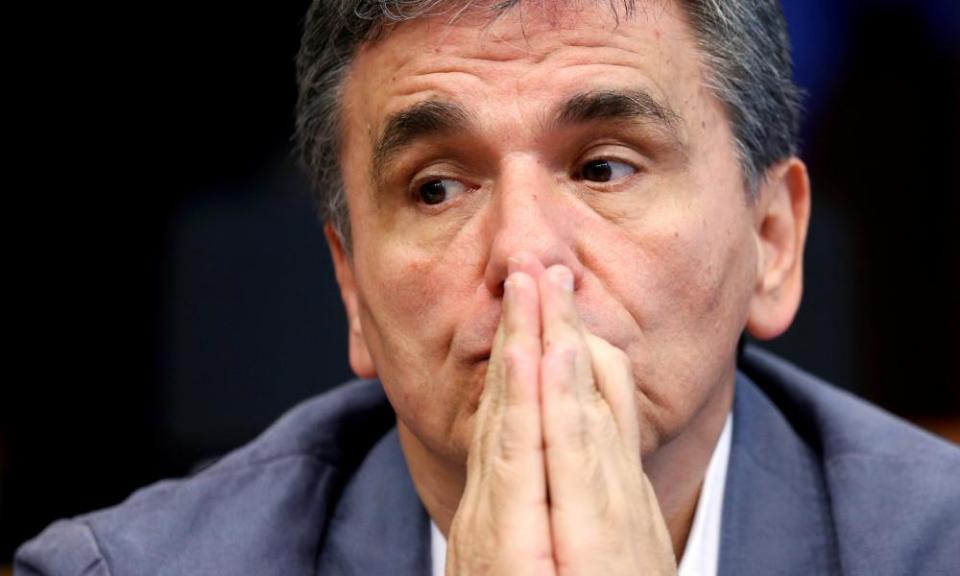Greece warns recovery threatened if debt deal is blocked at next talks

Greece on Monday issued a panic warning that its recovery would be thrown into doubt if Brussels blocked a debt deal at the next meeting of euro area finance ministers.
Fearing that Germany will insist on delays to an agreement until at least after elections in September, Athens’ finance minister hinted that the beleaguered nation could be plunged deeper into recession after seeing its economy contract by more than 25% since the start of its financial crisis.
With £7.5bn in debt repayments due in July and lenders meeting on 15 June to try and reach an agreement after failing last month, Euclid Tsakalotos made an urgent appeal for clarity on Monday.
“It is incumbent on all sides to find a solution,” he told foreign correspondents. “There is very little point in entering a [bailout] programme if the goal is not to leave the programme. And leaving the programme should be the responsibility not just of the debt country but the creditor country as well.”
Athens, Tsakalotos continued, had kept its side of the bargain, legislating highly unpopular reforms to produce savings of 2% of GDP, while the European Union and International Monetary Fund had not kept theirs.
“We can’t accept a deal which is not what was on the table,” he said. “What was on the table was if Greece carried outs its reform package then creditors would ensure that there would be a clear runway through clarity for debt.”
Instead, the IMF had refused to endorse the proposed solution – saying it fell far short of what was necessary to engender debt sustainability – with the result that Athens had been forced to reject it, Tsakalotos added. The Fund and Berlin – the biggest contributor of Greece’s three rescue programs – have long been in disagreement over how to reduce Greek debt.
Tsakalotos was addressing a hastily arranged press conference. Held in the dining room of the Athens’ mansion that houses the prime minister’s office, it appeared to highlight the mood of nervousness pervading the Greek government. With a debt mountain hovering around €314bn – or 180% of gross national product – the Syriza-dominated coalition of Alexis Tsipras has long argued that debt relief is essential to foreign investment and economic recovery.
Greece’s seven-year, triple bailout ordeal has not only deepened its dependency on international loans, but ultimately exacerbated the staggering debt load.
Under pressure from creditors to pass extra pension cuts and tax rises to unlock further bailout loans that would avert default in July, Tsipras had used the carrot of debt forgiveness to convince sceptical MPs of the need to support further austerity policies. The measures, which foresee already dramatically reduced pensions being slashed by up to 18% and the tax threshold being further lowered, are to be applied once the country’s third financial rescue programme expires in late 2018.
Before a meeting of Euro area finance ministers this month, Tsipras voiced optimism he would soon be forced to wear a tie – a promise the open-necked leftist has pledged to uphold once Greece’s debt problem is finally resolved. “The news is so positive we are having difficulty believing it,” he said, adding that the German chancellor, Angela Merkel, had come in to handle the issue personally.
But after more than eight hours of talks in Brussels, Greece’s creditors were unable to bridge their differences on the country’s ability to repay its debts in the long run.
It was hoped agreement was within reach – one that would not only result in loan disbursements but open the way to a debt deal that would allow the European Central Bank to include Greece in its quantitative easing programme and so permit it to reaccess capital markets.
Disagreement over growth projections and Athens’ fiscal budget surplus abilities further complicated matters. Confronting the IMF face on, the German finance minister, Wolfgang Schäuble, indicated there would be little room for compromise in a year of German general elections.
Without IMF participation in Greece’s latest €86bn bailout programme, both the German and Dutch governments have said it would be nigh on impossible to ratify further loan disbursements through their respective parliaments.
But time, said Tsakalotos on Monday, was running out. “Our ask is … that everyone keeps their side of the bargain. The position [of creditors] is going to be very difficult to defend. What can they say? That the Greek government did everything but we will send it to the rocks.”

 Yahoo Finance
Yahoo Finance 